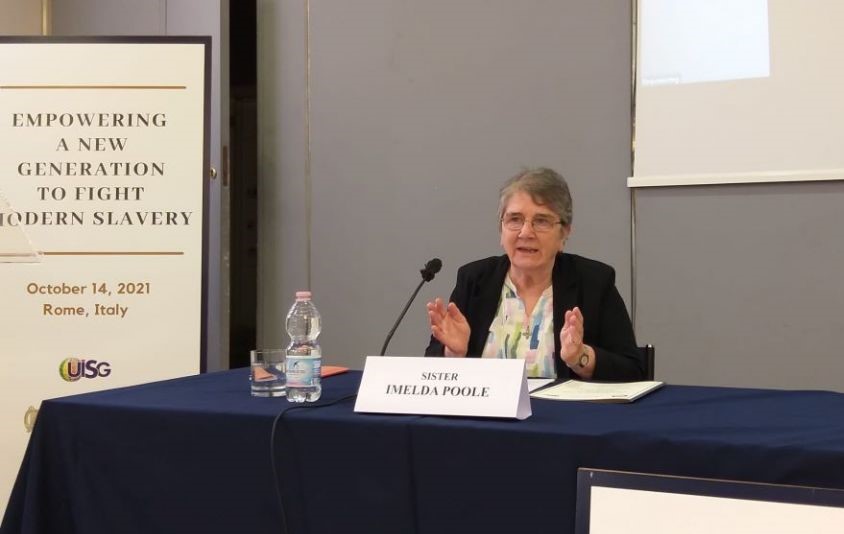
Loreto Sr. Imelda Poole speaks Oct. 14 at a panel discussion about empowering young people to help fight modern slavery. The event was sponsored by the U.S. and Irish Embassies to the Holy See in partnership with the International Union of Superiors General, the organization of leaders of women religious congregations around the world. (Courtesy of U.S. Embassy to the Holy See)
Catholic sisters, who for decades have been on the front lines fighting human trafficking, are looking to young people to join their ranks to help end modern slavery.
"When we talk about empowering the new generation to work with us on mission to eliminate the world of this heinous crime of human trafficking, maybe we need them to empower us," said Institute of the Blessed Virgin Mary Sr. Imelda Poole.
Her remarks came during an Oct. 14 panel discussion, "Empowering a New Generation to Fight Modern Slavery,” sponsored by the U.S. and Irish Embassies to the Holy See in partnership with the International Union of Superiors General, the organization of leaders of women religious congregations around the world.
Pool, who is the 2021 Trafficking in Persons Hero award recipient by the U.S. Department of State, praised the "special new generation emerging" that she believes is savvy with the internet and technology — skills she believes can be harnessed in fighting trafficking.
Advertisement
Pool also highlighted the role of art as a form of therapy to help victim survivors heal from their experiences and of plays and films written by young people to raise awareness of the untold realities of those who are trafficked.
"Our main responsibility is to listen and to listen actively so that we support them [young people] and are with them where they are at," Pool told a room of seasoned ambassadors, diplomats and religious figures. "Allow them to lead."
Pope Francis has repeatedly spotlighted the issue of human trafficking throughout his papacy, calling it a "crime against humanity," and religious sisters have arguably been the church's greatest asset in combatting it.
"Sisters have heard the constant call from Pope Francis urging all men and women of goodwill in all nations to take a firm stance against human trafficking," said Institute of the Blessed Virgin Mary Sr. Patricia Murray, executive secretary of UISG.
"Catholic Sisters," Murray said, "have been leading the way in both education, awareness and cross sectoral collaboration."
Now, however, she is eager to see young people advance that work, particularly through schools and youth organizations.
Hospitaller Sisters of Mercy Sr. Monica Chikwe, who is also vice president of the anti-trafficking group Slave No More, outlined several underlying factors that drive the practice: poverty, lack of education, job opportunities, a lack of fundamental human rights and conflict.
Religious sisters, she said, need to work to educate young people on these root causes and "let them be the principal actors."
"Empowering the new generation to fight the modern slavery will mean sensitizing them through training," she continued, saying that this issue should be an essential component of education in schools.
"Those girls on the street are not smiling. They are crying."
— Blessing Okoedion, human trafficking survivor
Comboni Missionary Sr. Gabriella Bottani, coordinator of Talitha Kum, an international network of sisters working to end human trafficking, noted that many young people have been energized by Pope Francis' call to care for creation.
She described this as a call to care for "people and nature."
"An economy without human trafficking is an economy of care," she added. The sustainability measures Pope Francis advocates for, and whose message young people are naturally sympathetic to, naturally includes caring for those who are trafficked, she said.
Nigerian survivor Blessing Okoedion offered a firsthand testimonial, saying that before her own horrific experience as a victim of trafficking in 2013, she cared only about her personal ambitions and dreams.
The plight of those being trafficked, she said, is seldomly recognized by others, even young people, recalling her own experience of being forced on the street and being told by her traffickers "you have to start smiling."
"Those girls on the street are not smiling," she told the audience. "They are crying."
Patrick Connell, chargé d’affaires of the U.S. Embassy to the Holy See, lauded both the work of the sisters and the courage of survivors, such as Okoedion, whose experience is the "source of untold suffering."
He described trafficking as an "affront to human dignity and human rights" and said there is a "moral duty" to fight it.
Derek Hannon, Irish ambassador to the Holy See, echoed that call and pointed to the example of the young Swedish climate activist Greta Thunberg as a reminder of young people's potential for elevating an issue of global concern.
"We need to do all we can to harness this energy and commitment," he concluded.







